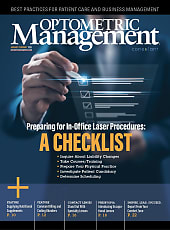May is Healthy Vision Month. Research reveals that less than half of consumers get an annual eye exam, even though most view one as an important component of their overall health.1 So, how can optometrists increase the likelihood of patients presenting annually?
Make It Personal.
Past president of the National Optometric Association Sherrol Reynolds, OD, FAAO, FNAP, recommends using occasions that personally resonate with individual patients, such as their birthdays.
Specifically, she advocates for sending birthday-themed postcard reminders.
Dr. Reynolds adds that postcards can be sent regarding national awareness months, such as Black History Month, Diabetes Awareness Month, or Glaucoma Awareness Month, to remind patients to make an annual appointment.
Preappoint From the Chair.
Joseph Allen, OD, FAAO, DiplABO, associate optometrist at Grove Eye Care, in Richmond, Virginia, points out that saying, ‘let’s get you on the schedule for next year,’” has been successful.
He adds that getting the patient on the calendar for the following year should also be part of the allied health staff’s operating procedure.

“Front desk personnel should automatically ask every comprehensive exam patient, ‘when can I schedule you for next year, so Dr. _______ can assess your vision and ocular health to make sure there haven’t been any changes,’” he offers. “Also, techs can ask patients how their friends or family members are doing, to plant the seed about the need for them to return for their annual comprehensive eye exams.”
Capitalize on Seasons.
Jeffrey J. Walline, OD, PhD, president of the American Academy of Optometry, suggests using seasons tied to eye care.
As an example, he says marketing during the back-to-school months has been a successful means of getting young patients to return annually.
Another suggestion: Send reminders about annual comprehensive eye exams toward the end of the year when health insurance and vision care plans are about to reset, he offers.
Educate Other Medical Professionals.
President of Latinos En Optometry Sandra Juarez Fortenberry, OD, FAAO, recommends educating other local medical professionals about the importance of the annual vision exam, so they can educate their own patients.” (See “Monitoring the Means,” below.) She also encourages creating reminders in Spanish. OM
Monitoring the Means
Sarah Cupples, MA, director of Marketing and Communications at The Ohio State University College of Optometry, recommends optometrists monitor their one or more means of getting patients to adhere to their annual comprehensive eye exams to determine which is most successful.
“Follow them [the means] to see what worked with your audience by monitoring the number of returning annual exams scheduled and asking what brought patients back,” she says.
Reference
1. Johnson & Johnson. New Survey on Eye Health Finds Most People Say They Know the Importance of an Annual Eye Exam, but - They Actually Don’t and They’re Not Getting One. Accessed March 25, 2025. https://www.jjvision.com/press-release/new-survey-eye-health-finds-most-people-say-they-know-importance-annual-eye-exam-they.



